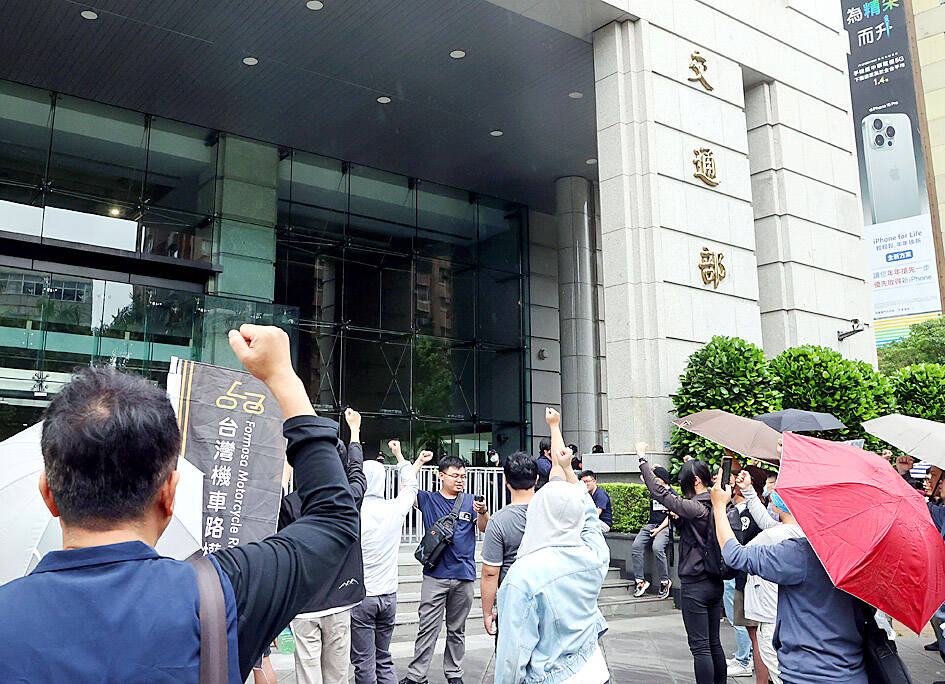Advocates of the rights of motorcycle and scooter riders yesterday protested in front of the Ministry of Transportation and Communications in Taipei, making three demands.
They were joined by 30 passenger vehicles, which surrounded the ministry to make three demands related to traffic regulations — that motorcycles and scooters above 250cc be allowed on highways, that all motorcycles and scooters be allowed on inside lanes, and that driver and rider training programs be reformed.
The ministry said that it has no plans to allow motorcycles on national highways for the time being, and said that motorcycles would be allowed on the inner lanes when the conditions allow.

Photo: CNA
Formosa Motorcycle Rights Association director Lo Yi (羅宜) said lawmakers should repeal various restrictions on motorcyclists stipulated in Article 99 of the Road and Traffic Safety Rules (道路交通安全規則), and should reform driver training to prevent unsafe driving practices that endanger motorcyclists.
“The outer lanes of many roads are used by truck drivers to temporarily park to load and unload goods, so inner lanes should be accessible to motorcyclists,” he said.
Regarding the use of heavy vehicles on national highways, Lo said that the ministry has not produced data showing that the accident rate of large motorcycles on highways is higher than that of passenger vehicles.
The ministry often pits motorcyclists against drivers of passenger vehicles, but many riders of large motorcycles are also drivers who use vehicles to commute to work, he said.
The association chose to surround the ministry with passenger vehicles to show that the rights of both groups overlap, he said.
The ministry said that due to differences in road design and traffic flow characteristics at intersections, local authorities would still be allowed to evaluate and plan lane access for motorcycles and two-stage left-turn control measures based on local conditions.
“It is not reasonable to completely abolish the restrictions on motorcycles and the rules on two-stage left turns,” it said.
Regarding motorcycle access to national highways, the ministry said it had reviewed indicators of safety, orderly riding and rider behavior, and found that behavior had deteriorated over the evaluation period, especially in regard to awareness of safe distances between vehicles.
“There are shortcomings and the public is still not in favor of allowing motorcycles on highways. Therefore, we will wait for improvements and public support before considering opening up highways to large motorcycles,” it said.
Regarding driver training, officials are considering introducing short-term licenses for drivers and riders with repeat and serious traffic violations, it said.
Those whose driving licenses are more than one year old, and whose driving licenses have been suspended for less than one year, would be required to take road safety training and pay fines in accordance with regulations if they wish to continue operating vehicles, it said.
Pending no other serious violations, licenses would be reissued to those individuals in growing intervals — periods of one, two, three and then six years, it added.

Taiwan has received more than US$70 million in royalties as of the end of last year from developing the F-16V jet as countries worldwide purchase or upgrade to this popular model, government and military officials said on Saturday. Taiwan funded the development of the F-16V jet and ended up the sole investor as other countries withdrew from the program. Now the F-16V is increasingly popular and countries must pay Taiwan a percentage in royalties when they purchase new F-16V aircraft or upgrade older F-16 models. The next five years are expected to be the peak for these royalties, with Taiwan potentially earning

STAY IN YOUR LANE: As the US and Israel attack Iran, the ministry has warned China not to overstep by including Taiwanese citizens in its evacuation orders The Ministry of Foreign Affairs (MOFA) yesterday rebuked a statement by China’s embassy in Israel that it would evacuate Taiwanese holders of Chinese travel documents from Israel amid the latter’s escalating conflict with Iran. Tensions have risen across the Middle East in the wake of US and Israeli airstrikes on Iran beginning Saturday. China subsequently issued an evacuation notice for its citizens. In a news release, the Chinese embassy in Israel said holders of “Taiwan compatriot permits (台胞證)” issued to Taiwanese nationals by Chinese authorities for travel to China — could register for evacuation to Egypt. In Taipei, the ministry yesterday said Taiwan

Taiwan is awaiting official notification from the US regarding the status of the Agreement on Reciprocal Trade (ART) after the US Supreme Court ruled US President Donald Trump's global tariffs unconstitutional. Speaking to reporters before a legislative hearing today, Premier Cho Jung-tai (卓榮泰) said that Taiwan's negotiation team remains focused on ensuring that the bilateral trade deal remains intact despite the legal challenge to Trump's tariff policy. "The US has pledged to notify its trade partners once the subsequent administrative and legal processes are finalized, and that certainly includes Taiwan," Cho said when asked about opposition parties’ doubts that the ART was

If China chose to invade Taiwan tomorrow, it would only have to sever three undersea fiber-optic cable clusters to cause a data blackout, Jason Hsu (許毓仁), a senior fellow at the Hudson Institute and former Chinese Nationalist Party (KMT) legislator, told a US security panel yesterday. In a Taiwan contingency, cable disruption would be one of the earliest preinvasion actions and the signal that escalation had begun, he said, adding that Taiwan’s current cable repair capabilities are insufficient. The US-China Economic and Security Review Commission (USCC) yesterday held a hearing on US-China Competition Under the Sea, with Hsu speaking on